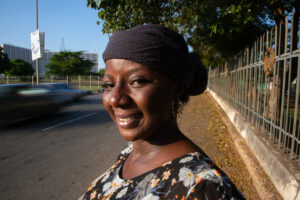“I feel more comfortable”: The ride hailing service in Nigeria determined to protect women
- Where conventional ride hailing apps have fallen short, HerRyde is working to ensure safety for women in Nigeria as both drivers and passengers.

Abuja, Nigeria (Minority Africa) — Toyin Agboola was the driver waiting for me after I ordered my ride. In a pool of over 80 women, she is one of the drivers providing commercialised transport services with HerRyde, a women-driving-women platform.
The ride-hailing app was launched in Abuja in August this year by Monsurah Oluwafuyi (CEO), Muhammad Muazu (COO) and Kamaldeen Ibrahim (CPO) to provide a safer option for women passengers and commercial drivers.
At 47 years old, Agboola has always liked driving but never thought it would be a job for her until January, when she saw a Bolt advert on Google Ads that encouraged women to take up commercial driving. As a Bolt driver, Agboola had to accept requests from both men and women. In some cases where her passengers were women, they would express their comfort with having a woman driver but where they were men, Agboola says they would sometimes express their reservation at the idea of being driven by a woman.
“I have had occasions where I would pick men and they would tell me they didn’t want to sit beside me and would prefer to sit at the back,” she says. “One said he felt like I was stressing myself driving commercially as a woman and [that] I should give him the car to drive for me; another said that he didn’t want to sit beside me because I was wearing a gown that was showing my laps.”
Men have primarily occupied the Nigerian transport sector. From cyclists, bus drivers and truck drivers to top positions in the National Union of Road Transport Workers (NURTW). This has been the norm for so long in Nigeria that being a commercial driver is now believed to be a male occupation, thus widening the gender disparity for women drivers who are now discriminated against and not patronised.

Ride-hailing giants like Bolt and Uber have had ongoing complaints lodged against them about drivers’ misconduct and lack of fundamental customer service. Although there is no published data on the issue, a quick Twitter search on Bolt will show an array of complaints ranging from theft to verbal abuse to assault and harassment, mostly by women.
Grace*, an Abuja resident, works in a restaurant where she has to close between 11:30 pm to 11:45 pm on most days. Using Bolt was her only option to find her way back home. She told me the drivers would often tell her to sit in the front or would sometimes refuse to take the trip if it wasn’t a cash payment.
On one of these “come to the front” trips, the driver kept touching her thighs while changing gears until he placed his hand on her thighs permanently. “I told him to stop and he asked: ‘Abi, you no like am?’” Grace recalls. To stop situations like this, her boyfriend started booking her rides. “Once they hear a man’s voice, they behave,” she says.
While Grace’s story resonates with many women, a less popular story is the harassment and assault of women commercial drivers by male passengers. “One time, a rider I picked up from the airport told me to park the car, so that he could come to the front seat,” says 35-year-old Chichi, who quit her 9-5 job to become a full-time commercial driver. “[When I did], he started talking and would place his hands on my lap. His excuse was: ’This is how I play.’ I dropped him off at his destination and he called me later, trying to solicit sex from me and other female drivers I might know.”

Complaints like this are recurrent, especially about Bolt but they are often met with little or no punishment for culprits.
According to Monsurah Oluwafuyi, the CEO of HerRyde, in addition to the inclusivity of women in the mobility sector, the basis of the platform is to “provide safety and comfort for women both as drivers and as riders.” As a woman who uses public transportation herself, the goal of the platform is to provide a service where women users do not have to stress when moving from one place to another; they can, instead, relish the comfort of a less invasive environment.
Hauwa Shaffi’ Nuhu, a journalist with HumAngle, shared her HerRyde experience with me. “Using HerRyde, I didn’t sit in the back; I sat in front. I felt safer, more comfortable and at ease,” she discloses. “I love to ride shotgun but unfortunately, I have to give up that little pleasure whenever it’s a male driver. The physical proximity makes me nervous.”
Since Agboola started making use of the HerRyde app as a commercial driver, she has been a bit more relaxed and comfortable. “When the news came to me about HerRyde, I loved it because I feel more comfortable carrying ladies and enjoy my ride with women.”

As HerRyde continues to penetrate the market hoping to make it safer for women, they recognize that having all-women drivers and all-women passengers does not guarantee complete safety. Because of this, they have put measures in place, including an SOS feature for both passengers and drivers, which alerts a rider’s emergency contact and HerRyde in case of an emergency.
“Unfortunately, there isn’t a way of ensuring 100% safety. For HerRyde, what we are trying to do is have a feature where passengers and drivers who sign-up can have their IDs screened,” explains Muhammed Muazu. “So if all our users and drivers are screened to some extent, the chances of violence and crimes are reduced. In cases where these things happen, we will follow up pronto by investigating the matter and reporting to the police.” He adds that “The idea is to make it as difficult as possible for anything to go wrong.”
The plan for HerRyde moving forward is to expand to other cities like Lagos, Kano and Ibadan. It also hopes to prioritise women’s empowerment by teaching women how to drive, setting up auto repair workshops and partnering with assessment management firms for women who want to drive but don’t have cars.
“The way we’re looking at it is ‘What do women need?’, ‘What are the things that can make a woman’s life a little bit easier?’, and [then we look into] how to make it accessible or cheaper,” says Kamaldeen Ibrahim.
*Grace’s name was changed to protect her identity.
Edited by Khadija Sanusi, Caleb Okereke, and Uzoma Ihejirika.
Shade Mary-Ann Olaoye is a gender and queer rights reporter whose work has appeared in Sahelien, AZ magazine, The Daily Dot, Media Diversity Institute and elsewhere.






